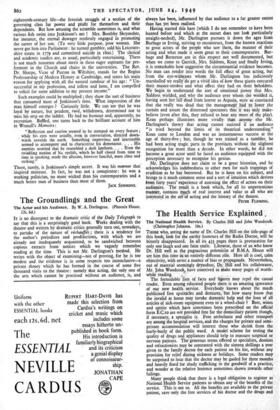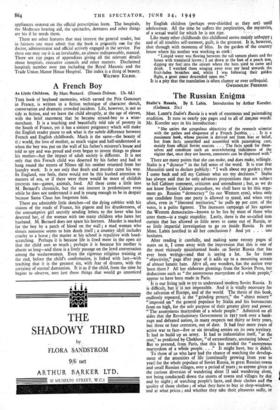The Health Service Explained
THOSE who, seeing the name of Dr. Charles Hill on the title-page of this book, look for the earthy humours of the Radio Doctor, will be bitterly disappointed. In all its 433 pages there is provocation for only one laugh and one faint smile. Likewise, those of us who know Dr. Hill well as the pugnacious polemicist of B.M.A. House will see him this time in an entirely different role. Here all is cool, calm objectivity, with never a nuance of bias or propaganda. Nevertheless, out of material seemingly dryasdust, Dr. Hill and his collaborator, Mr. John Woodcock, have contrived to make many pages of worth- while reading.
The formidable lists of facts and figures may repel the casual reader. Even among educated people there is an amazing ignorance of our new health service. Everybody knows about the much publicised free speCtacles and dentures, but how many know that the invalid at home may invoke domestic help and the loan of all articles of sick-room equipment even to a wheel-chair ? Beer, wines and spirits which have sometimes been prescribed on the official form E.C.ro are not provided free for the domiciliary patient though, if necessary, a specialist is. Free ambulance and other transpoit are among the hospital services, and the charges for private and semi- private accommodation will interest those who shrink from the hurly-burly of the public ward. A model scheme for testing the quality of drugs and appliances should help to reassure sceptical or nervous patients. The generous terms offered to specialists, dentists and refractionists may be contrasted with the sixteen shillings a year given to the family doctor for each patient on his list, without any provision for relief during sickness or holidays. Some readers may be surprised to hear that the doctor may be gaoled for three months and heavily fined for shady trafficking in the goodwill of a practice, and wonder at the relative lenience sometimes shown towards other failings.
Many people think that there is a legal obligation to register asv National Health Service patients to obtain any of the benefits of the service. This is not so. All the benefits are available to the private patient, save only the free services of his doctor and the drugs and
appliances oraerea on the official prescription form. The hospitals, the Medresco hearing aid, the spectacles, dentures and other things are his if he needs them.
There are other features that may interest the general reader, but in fairness one must admit that the book is priparily one for the doctor, administrator and official actively engaged in the service. For these one may say it is an invaluable, an almost indispensable, manual. There are 15o pages of appendixes giving all the relevant details about hospitals, executive councils and other matters. Disclaimed hospitals number over zoo including the Royal Masonic and the Trade Union Manor House Hospital. The index is a thing of beauty.
WILFRED KILROE.



































 Previous page
Previous page